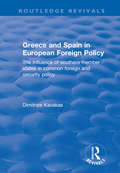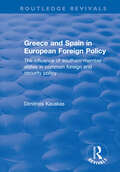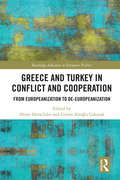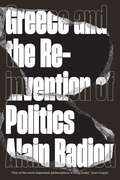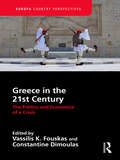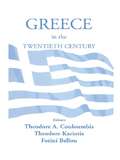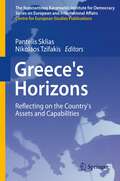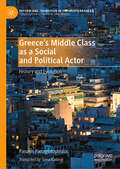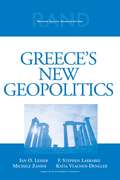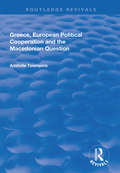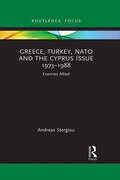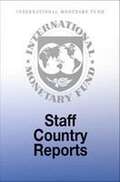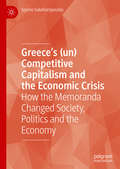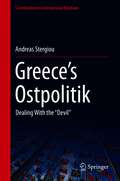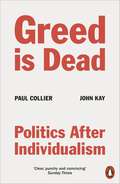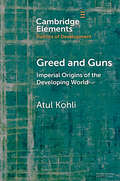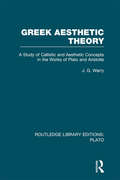- Table View
- List View
Greece and Spain in European Foreign Policy: The Influence of Southern Member States in Common Foreign and Security Policy (Routledge Revivals Ser.)
by Dimitrios KavakasThis title was first published in 2001: This in-depth analysis of the foreign policy behaviour of Greece and Spain, draws conclusions on the role and influence that the two southern member states have had at different times. Dimitrios Kavakas concentrates on four aspects: the history; adaptation of domestic structures; patterns of behaviour in participation of the Common Foreign Security Policy (CFSP); and the issue of securitization. Allowing the reader to explore other aspects apart from the study of foreign policy of European Union member states, this invaluable work will find an audience among research and masters students as well as undergraduates. It is also suitable for courses of European foreign policy, comparative policy analysis and specialist courses on politics, international relations and European studies.
Greece and Spain in European Foreign Policy: The Influence of Southern Member States in Common Foreign and Security Policy (Routledge Revivals)
by Dimitrios KavakasThis title was first published in 2001: This in-depth analysis of the foreign policy behaviour of Greece and Spain, draws conclusions on the role and influence that the two southern member states have had at different times. Dimitrios Kavakas concentrates on four aspects: the history; adaptation of domestic structures; patterns of behaviour in participation of the Common Foreign Security Policy (CFSP); and the issue of securitization. Allowing the reader to explore other aspects apart from the study of foreign policy of European Union member states, this invaluable work will find an audience among research and masters students as well as undergraduates. It is also suitable for courses of European foreign policy, comparative policy analysis and specialist courses on politics, international relations and European studies.
Greece and Turkey in Conflict and Cooperation: From Europeanization to De-Europeanization (Routledge Advances in European Politics)
by Alexis Heraclides Gizem Alio 287 Lu ÇakmakThis book offers a sober, contemplative and comprehensive coverage of Greek–Turkish relations, covering in depth the current political climate, with due regard to the historical dimension. The book includes up-to-date accounts of the traditional areas of unresolved discord (Aegean, minorities, Cyprus, the Patriarchate), with emphasis on why they remain contentious, despite the thaw in Greek–Turkish relations from 1999 until recently. It also covers new topics and challenges that have led to cooperation as well as friction, such as unprecedented economic cooperation, energy resources, or the refugee crisis. Furthermore, the volume deals with the ‘Europeanization’ of Greek–Turkish relations and other facilitating factors as they appeared in the first decade of the 21st century (including the role of civil society) as well as the contrary, ‘de-Europeanization’ from the 2010 onwards, which presages a hazardous downward trend in their relations, often not helped by the media in both countries, which is also examined. This volume will be essential reading to scholars and students of Greek–Turkish relations, more generally Greece and Turkey, and more broadly to the study of South European Politics, European Union politics, security studies and International Relations.
Greece and the Cold War: Front Line State, 1952-1967 (Cold War History)
by Evanthis HatzivassiliouThis is the first study to present a comprehensive analysis of Greek foreign and internal policy during the Cold War, covering the key period from the country’s accession to NATO in 1952 until the imposition of the colonels’ dictatorship in 1967. Clearly divided into three parts: 1952-55, 1955-63 and 1963-67, this book deals with Greek foreign policy analysis; threat perception; the NATO connection (including Greek-US relations, the rise of anti-Americanism in 1955-58 and in 1964-67, the economic dimension of security and the issue of US military aid); Greek policy towards the Soviet bloc; and the regional dimension, mainly Greek policy towards Turkey and Yugoslavia, and (for the 1964-67 years) the Cyprus crisis which greatly complicated Greek security obligations. This book will be of great interest to students of Greek politics, Balkans history, the Cold War and strategic studies.
Greece and the Reinvention of Politics: On Greece
by Alain BadiouOne of the world’s leading radical philosophers analyses the failure of the Syriza experience in GreeceIn a series of seven trenchant interventions Alain Badiou analyses the decisive developments in Greece since 2011. Badiou considers this Mediterranean country “a sort of open-air political lesson”, with much to tell us about the wider situation. Greece is exemplary of “our fundamental contradictions in Europe, which are also ultimately the fundamental contradictions of the world such as it is—the world served up to the authoritarian anarchy of capitalism.”Notwithstanding the Greeks’ heartening opposition to the financial markets’ hegemony, Badiou considers it also important to address the reasons why this opposition failed. “Movementist” politics may arouse widespread sympathy, but for the French philosopher they have “absolutely no effect other than to temporarily trap the movement in the negative weakness of its affects.”Badiou argues that a consequential opposition inspired by the emancipatory politics of the past—or by what he calls “the communist hypothesis”—should set its compass by the “orienting maxims” proposed in this book, defining a direction for political action.
Greece in the 21st Century: The Politics and Economics of a Crisis (Europa Country Perspectives)
by Vassilis K. Fouskas Constantine DimoulasFor most of the first part of the 21st century Greece has been seen as a critical battlefield for the survival of the powerful and the adjustment or extinction of the weak, as if all the historical contradictions of the global financial crisis and the eurozone crisis were concentrated in that tiny part of the world, with a population of just 11 million people and a GDP of less than 2% of that of the European Union as a whole. While the country has been overpowered by the disciplinarian and deeply authoritarian policy mix of ordoliberal/neoliberal rules, as this book attempts to show, there is hope. Defeat does not end the crisis, and crisis means constant opportunity. In this state of affairs, all types of agencies try to take advantage of the conditions and opportunities in order to advance towards positions of power and provide the best of solutions for the class interests they represent. Thus, harsh conflict is inevitable and if history provides a yardstick, it is that in periods of conflict and crisis, the winner, usually, is the one who manages to strike the right political and social alliances at the right time. The editors have assembled in this volume a number of interdisciplinary chapters and arguments which, despite their differences, share the strategic aim of a critique of both neoliberalism/ordoliberalism and new authoritarianism. Chapters examine the eurozone crisis from a variety of angles with reference to Greece, and Greek politics and society. With this collection of heterodox and scholarly essays, the authors and editors aim to offer a progressive understanding of current historical circumstances. Constantine Dimoulas is an Assistant Professor in social administration and evaluation of social programmes at Panteion University, Greece. Vassilis K. Fouskas is Professor of international politics and economics at the University of East London, UK, and the founding editor of the Journal of Balkan and Near Eastern Studies (Taylor & Francis).
Greece in the European Union (Europe and the Nation State #Vol. 2)
by Dionyssis G. Dimitrakopoulos Argyris G. PassasThe contributors collected here discuss the patterns of continuity and change, success and failure observed in seven policy areas - environment, social regulation, regional policy, the single market, agriculture, EMU and foreign policy - in order to investigate how policy formulated and implemented in Greece has changed as a result of EU membership; why Greek authorities have managed to implement EU policy more successfully in some policy areas than in others and whether Greek public opinion vis-à-vis the EU changed over time.This book argues that although the widely-held belief that Greece is a laggard in a number of policy areas is not inaccurate, the pattern of Greek membership of the EU is much more complex, not least because it contains success stories. It will be of interest to students and researchers of the European Union, public policy and Greek politics.
Greece in the Twentieth Century
by THEODORE A. COULOUMBIS THEODORE KARIOTIS Fotini BellouThis collective study examines the transformation (metamorphosis) that Greece has experienced over the course of the 20th century by exploring its gradual evolution into a consolidated democracy, an advanced economy in the Eurozone and a balanced partner in the EU and NATO promoting a stabilizing role in southeastern Europe.The book examines the variables contributing to the profiling of contemporary Greece, emphasizing the conceptual inertia bedevilling the studies of Greece in recent years by focusing on the elements that indicated the slow pace in the country's modernization. In conclusion, there is a need for Greece's constant commitment to functional adjustments regarding the country's economic, political and strategic priorities in order to promote effectively the role of regional stabilizer acting in concert with NATO and EU partners.
Greece's Horizons
by Pantelis Sklias Nikolaos TzifakisThe Greek economic crisis has imperilled the stability of the eurozone, generating much global anxiety. Policymakers, analysts, and the media have daily debated the course of the Greek economy, prescribing ways to move forward. This collection of essays progressively moves from an analysis of the causes of the crisis and the policy responses so far to a debate on some of the countryʼs advantages and capabilities that should underpin its new development model and propel the return to growth. The book analytically chooses to view the glass as half-full and seeks to provide motivation and inspiration for change by indicating some of the economic sectors where Greece maintains a comparative advantage. Therefore, it challenges the emerging picture of Greece as a country doomed to failure, where everything falls apart.
Greece's Middle Class as a Social and Political Actor: History and Evolution (Reform and Transition in the Mediterranean)
by Panayis PanagiotopoulosThis book provides a comprehensive account and conceptualisation of the history and development of the middle class in Greece. What is the history of the middle class in the West after World War II? How is it related to consumerism, individualism and emancipation? How did it reach this, now unanimously admitted, existential crisis? Which is the historical course of the middle class in Greece from the 1960s onwards? Through which experiences was the social contract of the middle class during the Metapolitefsi drawn up? How is it that the Greek family acts as the middle class&’ natural habitat and its condemnation at the same time? Is there still a middle class identity in Greece or is it scattered in rival micro-communities of people who can hardly co-exist today, in a space of social and emotional desolation? Will the pandemic crisis validate the inequalities that govern the relationships among the members of the old middle class in Greece or will it prove to be a chance for a new social and cultural convergence?
Greece's New Geopolitics
by Michele Zanini Ian O. Lesser F. Stephen Larrabee Katia VlachosGreece has been profoundly affected by recent changes in the international environment, on its borders, and within the country itself. Many long-standing assumptions about Greek interests and Greece's role have fallen away and have been supplanted by new approaches. The country has become progressively more modern and more European, and its international policy has become more sophisticated. At the same time, the geopolitical scene has evolved in ways that present new challenges and new opportunities for Athens in its relations with Europe, the United States, and neighboring countries. Many of these challenges cross traditional regional boundaries and underscore Greece's potential to play a transregional role, looking outward from Europe to the Mediterranean, Eurasia, and the Middle East. This report explores the new geopolitical environment Greece faces, paying special attention to the implications for southeastern Europe and transatlantic relations; explores options for Greek strategy; and offers some new directions for policy in Greece and on both sides of the Atlantic.
Greece, European Political Cooperation and the Macedonian Question (Routledge Revivals)
by Aristotle TziampirisThis title was first published in 2002. An important examination of an international event from the perspective of Greek foreign policy, within the wider context of foreign policy in European integration
Greece, Turkey, NATO and the Cyprus Issue 1973–1988: Enemies Allied (Europa Regional Perspectives)
by Andreas StergiouThe volume examines one of the most sensitive issues in the contemporary diplomatic history of the eastern Mediterranean, namely, the nexus between Greece, Turkey, the Cyprus problem and NATO in the crucial period between 1973 and 1988. Beginning with the emergence of the Aegean dispute in 1973 and ending with the most comprehensive attempt to date to solve the Greek–Turkish conflict in the wake of the Davos rapprochement process in 1988. The analysis in this book goes back to developments that occurred in the first half of the 20th century.
Greece, the EEC and the Cold War, 1974-1979
by Eirini KaramouziEirini Karamouzi explores the history of the European Economic Community (EEC) in the turbulent decade of the 1970s and especially the Community's response to the fall of the Greek dictatorship and the country's application for EEC membership. The book constitutes the first multi-archival study on the second enlargement of the EEC.
Greece: Selected Issues
by International Monetary FundA report from the International Monetary Fund.
Greece: Selected Issues (Imf Staff Country Reports #Country Report No. 13/155)
by International Monetary Fund. European Dept.A report from the International Monetary Fund.
Greece: Selected Issues (Imf Staff Country Reports #Country Report No. 13/155)
by International Monetary Fund. European Dept.A report from the International Monetary Fund.
Greece: Selected Issues (Imf Staff Country Reports #Country Report No. 13/155)
by International Monetary Fund. European Dept.A report from the International Monetary Fund.
Greece’s (un) Competitive Capitalism and the Economic Crisis: How the Memoranda Changed Society, Politics and the Economy
by Spyros SakellaropoulosThis book reviews the profound transformation to the Greek political economy in recent years and considers the reasons that have led to this transformation. Further, the author explores the social experimentation and social diversity that evolved as a result of the Greek and international economic crises. By challenging various assumptions made about the crisis, the author sheds light on Greek social relations and the country’s particular type of capitalist development.This book will be of value to both economists and sociologists, linking discussions about social class with economic, political and institutional analyses.
Greece’s Ostpolitik: Dealing With the ‘‘Devil’’ (Contributions to International Relations)
by Andreas StergiouThe book examines the rapprochement between Greece and Eastern Europe during the Cold War. ''Ostpolitik'', which translates to ‘‘Opening to the East’’ is used to describe the policy of conducting affairs with the Soviet Bloc. Using primary sources from Greece, Eastern European States, Cyprus, NATO, the United States, Germany and United Kingdom, this book provides historical and foreign policy analysis of a tumultuous period in the Eastern Mediterranean. The book first illustrates Greece's position in the Cold War confrontation before moving to more detailed analysis of the Eastern Bloc's policies towards Greece and Cyprus with an emphasis in the harmonious relationship between the Greek military dictatorship and the Communist countries (1967-1974). It analyses the U-turn in Greek foreign and defence policy and the replacement of the Communist ''devil'' by a new one, an equally capitalist country and NATO-ally, Turkey. The book also covers Greece's efforts to elicit the Communist countries' support against a member of its own Western alliance, as well as the NATO response to this existential threat against its coherence. A comprehensive study of the East-West competition in South-Eastern Europe and the Eastern Mediterranean during the Cold War, this volume is ideal for researchers and students interested in the international relations of twentieth century Europe and the historical background of the still hot Greek-Turkish Conflict.
Greed
by Stephen Barber Alexis BrasseyFor all of the technical explanations for meltdown in the financial markets during the banking crisis, the most readily accepted and almost universal explanation is the single word 'greed'. This is a subject which can at once be seen as the disease at the heart of society and the motivating force behind the progress of mankind.
Greed Is Dead: Politics After Individualism
by Paul Collier John KayTwo of the UK's leading economists call for an end to extreme individualism as the engine of prosperity 'provocative but thought-provoking and nuanced' TelegraphThroughout history, successful societies have created institutions which channel both competition and co-operation to achieve complex goals of general benefit. These institutions make the difference between societies that thrive and those paralyzed by discord, the difference between prosperous and poor economies. Such societies are pluralist but their pluralism is disciplined.Successful societies are also rare and fragile. We could not have built modernity without the exceptional competitive and co-operative instincts of humans, but in recent decades the balance between these instincts has become dangerously skewed: mutuality has been undermined by an extreme individualism which has weakened co-operation and polarized our politics.Collier and Kay show how a reaffirmation of the values of mutuality could refresh and restore politics, business and the environments in which people live. Politics could reverse the moves to extremism and tribalism; businesses could replace the greed that has degraded corporate culture; the communities and decaying places that are home to many could overcome despondency and again be prosperous and purposeful. As the world emerges from an unprecedented crisis we have the chance to examine society afresh and build a politics beyond individualism.
Greed and Guns: Imperial Origins of the Developing World (Elements in the Politics of Development)
by Atul KohliThis Element studies the causes and the consequences of modern imperialism. The focus is on British and US imperialism in the nineteenth and the twentieth centuries respectively. The dynamics of both formal and informal empires are analyzed. The argument is that imperialism is moved mainly by the desire of major powers to enhance their national economic prosperity. They do so by undermining sovereignty in peripheral countries and establishing open economic access. The impact on the countries of the periphery tends to be negative. In a world of states, then, national sovereignty is an economic asset. Since imperialism seeks to limit the exercise of sovereign power by subject people, there tends to be an inverse relationship between imperialism and development: the less control a state has over its own affairs, the less likely it is that the people of that state will experience economic progress.
Greedy Bastards
by Dylan RatiganThe host of the eponymous MSNBC show, Dylan Ratigan offers a bold and original post-partisan program to resuscitate the American Dream. At a time of deep concern with the state of America's economy and government, it seems that all the media can give us is talking (or screaming) heads who revel in partisan brinkmanship. Then there's Dylan Ratigan--an award-winning journalist respected and admired across the political spectrum. In Greedy Bastards, he rips the lid off of our deeply crooked system--and offers a way out.Employing the nuanced reporting and critical analysis that have earned him so much respect, Ratigan describes the five "vampires" that are sucking the nation dry, including an educational system that values mediocrity above all else; a healthcare system that is among the priciest and least-effective infrastructures in the industrialized world; a political system in which lobbyists write legislation; a "master-slave" relationship with our Chinese bankers; and an addiction to foreign oil that has sapped our willingness to innovate. In offering solutions to these formidable and entrenched obstacles, he does nothing less than lay the groundwork for a political movement dedicated to tackling the rot at the heart of the country. In its desperation, America needs more than just endless stock tips and Wall Street navel-gazing. It needs passionate debate and smart policy--and a hero to take on the establishment. Dylan Ratigan is that hero, and this is the book that will rally people behind him. make it right.
Greek Aesthetic Theory (Routledge Library Editions: Plato)
by J G WarryThis book provides a clear and informed account of aesthetic and callistic concepts as they occur in the works of Plato and Aristotle. The author illustrates their ideas on art and beauty by close reference to their texts and finds a profound similarity which unites them, revealing many of their differences to be complementary aspects of an essentially similar viewpoint. He also shows how Greek notions of art and beauty are not merely primitive steps in the advance to modern ideas but have a direct relevance to modern critical controversies.
